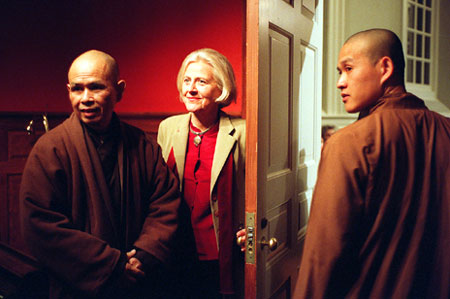Peace in the heart, peace in the world
Thich Nhat Hanh brings his message to the Memorial Church

“Terrorism can be located in the human heart.” Soft-spoken Vietnamese Buddhist monk Thich Nhat Hanh spoke these words to a hushed crowd at the Memorial Church March 8. “We can remove terrorism from the human heart through the practice of deep listening. Deep listening can help remove wrong perceptions.”
The free public event was sponsored by the Harvard Buddhist Community and the Memorial Church. People thronged to the church as early as 6 p.m. for the 7 o’clock talk.
The crowd settled into pews and, when the pews filled up, sat in the aisles. Nhat Hanh’s teachings have found a broad audience in the West, reaching across religious traditions. He is revered as much for his lifelong work as a peace activist as for his exquisitely straightforward lessons.
A prolific author – he has written 85 books of prose, poetry, and prayer – Nhat Hanh is famous for his work during the Vietnam War when he encouraged Buddhist monks to emerge from their contemplative lives to help the suffering people of Vietnam. He calls this “engaged Buddhism.”
When Nhat Hanh walked onto the altar, students of his who had gathered there bowed in return to their teacher’s respectful greeting: the men with shaved heads, the women whose hair was covered by scarves matching their simple brown robes. The audience also returned Nhat Hanh’s bow.
“My dear friends,” he said, “every time you bring your attention to your in-breath and your out-breath, you are focused and you don’t think of the past, the future, your projects. In our daily life we breathe all the time but we are seldom aware of our breathing.”
He speaks softly, this monk in his mid-70s who has been exiled from his homeland for more than 30 years because of his nonviolent efforts to reconcile North and South Vietnam. After he was exiled, Nhat Hanh persuaded Martin Luther King Jr. to publicly oppose the war. King nominated Nhat Hanh for the Nobel Peace Prize in 1967. “Conferring the Prize on Nhat Hanh,” wrote King, “would … remind all nations that men of good will stand ready to lead warring elements out of an abyss of hatred and self-destruction.”
For Nhat Hanh, world peace and interpersonal peace are found in the same way. He uses the analogy of seeds within each person – seeds of anger and violence, but also seeds of compassion and understanding. Nhat Hanh advises the practice of what he calls “selective watering.”
“You and your loved one can sign a peace treaty,” he said to quiet laughter. Nhat Hanh would have us tell our loved one, “‘Darling, I promise I will avoid watering the seeds of anger, violence, and despair in you.’
“Many of us are peace activists,” Nhat Hanh continued. “We want to serve the world. So we have to take care of ourselves. Every day, water the seeds of understanding and compassion. Breathe in, breathe out the energy of mindfulness. This energy helps us look deeply into the nature of our emotions, so we can gain insight into our suffering and the suffering of others. Insight always brings compassion.”
Violent actions cannot cultivate peace, Nhat Hanh teaches. “Suppose someone does something that makes you suffer,” he said. “You want to punish that person. But with mindfulness you become aware of your desire to punish, and you become aware that the other person may have a lot of wrong perceptions that cause him anger and despair. He needs help, he doesn’t need punishment. Understanding him makes compassion arise in your heart.”
As in our relationships with our loved ones, so in our relations with the world. When fellow Buddhists were gunned down in Vietnam, Nhat Hanh and his co-activists responded nonviolently. He would now have America act similarly toward those who perpetrate attacks against our country. “We would like,” he said, “to address the people who have tried to destroy us, say to them ‘We know you must have suffered a great deal to do such a terrible thing to us. We would like to listen to your suffering. We want to live in safety, and we know you also want to live in safety.’ It is only by understanding suffering that we can reduce suffering.”
As Nhat Hanh spoke, the crowd seemed to lean into his words. Dorothy Austin, associate minister of the Memorial Church, reported that she felt her conviction grow as she listened to Nhat Hanh’s words. “The most basic principle of interfaith dialogue is that the dialogue must begin within oneself,” she said. “Our capacity to make peace with another person and with the world depends very much on our capacity to make peace within ourselves.”
“I was struck by the still and warm atmosphere Nhat Hanh created,” said Chris Bell, co-chair of the Harvard Buddhist Community, “and by the power of his smile. One learned as much about mindfulness from observing the way he held his tea as by processing the words he was oh-so-quietly saying.”
And quietly, Nhat Hanh delivered a gentle challenge: “I propose in America that we organize televised sessions of deep listening,” he said. In these sessions, the nation’s perceived enemies would pour forth their pain and suffering. “When America expresses her willingness to understand the suffering of other people, she will inspire respect. Showing understanding and compassion is the best way to provide ourselves and other people with safety.”




